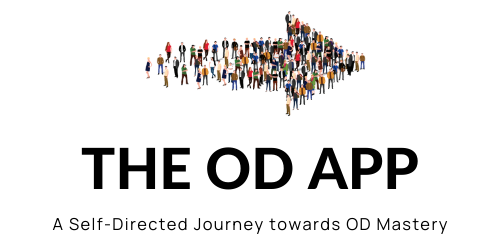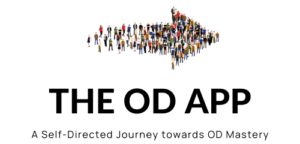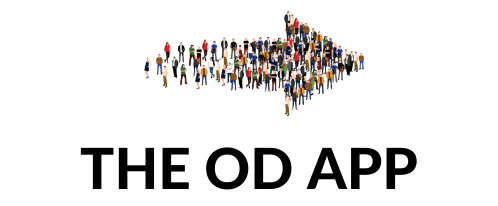Step 1 – Getting the ‘Lay of the Land’
This first step is simply to review the overall app content, asking you to give particular attention to the two main content sections: the 11 foundational OD competences and the collection of OD specialisms. This is best seen as an educational step, allowing you to explore how the content of the app is laid out, becoming familiar with the definitions of the 11 competences—their various parts and distinctions—as well as exploring the different OD specialisms. This step is not about making decisions. You are merely becoming acquainted with the features, content and sections. It’s like becoming familiar with a map before setting out on a long walk. It is important to have a sense of the whole before diving deeper into any particular part.
It is important not to rush through this step. Allowing the content to ‘sink in’ will aid you in the subsequent steps which will involve more focused reflections about your past, present and future relative to your professional calling. As mentioned, this step is best seen as an educational step – revealing something of the richness and possibilities that inform the practice patterns of competent OD professionals.
Foundational Competences
Consulting Processes
The many roles that an OD practitioner may fill in serving clients are expressions of consulting processes. When a client has identified needs around which they commission the help of an OD practitioner, the practitioner, whether from an internal or an external position
Contextual Acumen
Contextual acumen is a fundamental competence for an OD practitioner. Effective diagnosis and choice of intervention requires a clear understanding of the context from which (or in which) the organisation functions. ‘Context’ has at least three aspects
Culture Work
All human systems—communities, organizations, teams, families, etc.—are characterized by unique sets of beliefs, customs, habits, rules, and behavioural expectations that, through human interactions and expressions, form distinct behavioural patterns that are recognised by others as their ‘culture’
Life-Long Learning
“OD Practitioners are behavioural scientists who, through effective relationship-building skills, deliver help and support to a client system with the dual goal of improving the performance as well as the internal health of the system
Relationships with Others
OD work takes place almost exclusively in the relationship arena—working with leaders, teams, multiple groups, consumers, internal and external stakeholders. The practice of OD engages with people spread across the spectrum of ranks, functions
Systems Navigation
An OD practitioner who is a competent human system navigator is acutely aware of the deeply entangled and interacting elements that weave through and comprise all human enterprises. Discerning the patterns that emerge through those dynamic layers
The Use of Self
To work effectively with a living system, an OD practitioner needs to have deep insight into themself—who they are, how they work, and their own instrumentality. They need to effectively and usefully be able to manage their impact on a client system
Theory and Practice
As a field, OD is working with dynamic and evolving human systems. This means that the OD Theory and Practice competence necessarily informs every aspect of an effective OD practitioner’s work
Working with Change
In an open system environment, if an organisation is to survive, the ability to undergo continuous change, transformation, and adaptation must be deeply embedded in its behavioural and cultural patterns
Working with Diversity, Inclusion, Equality and Equity
The term “dignity of differences” is also the title of a book by Jonathan Sacks, a philosopher and theologian who believed that the survival of humanity is dependent on our ability to accord respect and dignity to those who are different from us
Working with Group Processes
A fundamental characteristic of human nature is to gather together—informally and formally—for the purposes of survival and mutual support. Simply put, human beings form groups
OD Specialisms
Appreciative Inquiry
Appreciative Inquiry is the cooperative co-evolutionary search for the best in people, their organizations, and the world around them. It is the art and practice of asking unconditional positive questions that strengthen a system’s capacity to apprehend, anticipate, and heighten its potential
Change Management
Change management addresses the people-side of change. Three levels can be described: For individuals, it involves supporting each person’s change journey. For organizational initiatives, it’s about equipping people to adopt and use solutions. For enterprise change, it’s about embedding change into the fabric of the organization.
Coaching
Coaching is a learning conversation with the client at the centre—enabling learning by identifying new perspectives, unlocking ideas, and building confidence, while unlearning outdated mindsets, behaviours, and strategies so the client can be effective and live a life that feels truly meaningful within an ethical and value-driven framework
Design Thinking
Design thinking is at least an iterative process for problem solving, centred around human needs. It is an approach to creative problem solving, often addressing ‘wicked problems’ that involve multiple interconnected stakeholders and systems, with no distinct solution pathways
Dialogic OD
Dialogic OD represents a return to OD’s original spirit of inquiry, reflecting an appreciation that today’s organizational problems are more complex, ambiguous and uncertain, with Dialogic OD being especially suited to complex, adaptive challenges.
Diversity, Equity and Inclusion (DEI)
DEI work has evolved over the past 30+ years. Today the conversation includes Black, Indigenous, People of Color, people identifying as LGBTQI. We are sensitive also to factors like social class and religious differences
Gestalt OD
Gestalt OD allows us to make a real difference with our presence. We can heighten our clients’ awareness of what is happening in the moment. We can craft more powerful (and often simpler) interventions. It keeps the focus on the client and helps us to facilitate closure
Group Process Consultation
Group Process Consultation is ‘the reasoned and intentional interventions by the consultant, into the ongoing events and dynamics of a group, with the purpose of helping the group effectively attain its agreed-upon objectives
Human Interaction Labs
HI labs bring small groups together for a period of time to learn about themselves and their interactions with others via an experience-based learning environment, giving and receiving feedback, assessing the impact of their actions and behaviours, and observing how roles, norms, decisions and power emerge
Human Systems Dynamics (HSD)
Human Systems Dynamics (HSD) is rooted in complexity science and chaos theory. The core Pattern of Professional Performance in HSD is Adaptive Capacity—the agility to engage with change as it happens and to help others do the same, expressed via three process disciplines: Inquiry, Adaptive Action, and Pattern Logic
Large Group Intervention (LGI)
LGIs are methods by which all the stakeholders in a system may contribute their voices to change processes, designed to ensure that voices and perspectives are heard and integrated, and new understandings can emerge—processes that involve the whole system in a journey of discovery and co-creation
Organisational Agility
Organisational agility has become a strategic imperative for many CEOs as organisations struggle to keep up with, and adapt to, the rapidly shifting business context
Organization Design
Organizational Design views organizations as systems with interdependent elements collectively working to deliver a purpose. Not mechanical systems and pyramid hierarchies that can be manipulated, but rather networks, collaborations, and complex adaptive systems that ‘emerge’ – and can only, perhaps, be shaped
Team Effectiveness Coaching
Team Effectiveness Coaching creates a safe space with a foundation of support and challenge for team members to reflect on how they work and learn together and, through dialogue, to identify and act upon what is needed to enhance team performance and impact
The Practice of Facilitation
Facilitation is a process mastery by which meetings/workshop procedures are conducted, creating an inclusive space for a group to do its best work together, in which decisions are made more easily, efficiently and effectively, with outcomes being accepted and embraced by the group
Virtual OD Facilitation
Virtual OD Facilitation is the ability to design and implement constructive group conversations entirely online using a virtual digital platform. These could be workshops, meetings, ideation sessions, events, or any other name given to a container that gets created and facilitated



